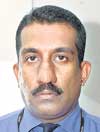|
Corporate protection
in Sri Lanka: the way forward
By
Robert Ingall
For business it can be a harsh world out there,
what with political and industrial espionage, terrorism, business
sabotage, to colossal fund and share fraud, not to mention acts
of nature. Senior management can sometimes feel justified for earning
the bucks they do.
The problem is that simply hiring security guards just doesn’t
cover all the threats. Then there is complacency, or management
just not having the time or expertise to do the necessary job. “There
is also the fact that the right professional design for corporate
protection and a fire safety model of a modern business unit can
contribute to enhance the bottom line revenue yield,” said
Damith Kurunduhewa, CEO of Strategic Security Solution and a specialist
in corporate security issues.
 |
| Damith Kurunduhewa |
“We don’t deal with security guards,
we train the security already in place and the relevant management
on the best ways to protect their business from a whole number of
potential damaging scenarios,” he said.
And the number of solutions for those potential scenarios is impressive,
from customised corporate risk management, to performance training
initiatives for frontline security staff, to business vulnerability
studies strategic and proactive planning initiatives, to name but
three.
What his company does, and it is presently the only one in the country,
is customise security procedures for companies against all imaginable
risks.
Mr. Kurunduhewa, who is also the strategic security specialist,
has two partners, Wg. Cdr. C.A.O. Dirckze, who is the head of Fire
Safety Initiatives, and Mr. Shirley Silva, who leads the training.
But how did this unique service come about? After leaving the army,
Mr. Kurunduhewa moved into the security sector with a number of
companies, including SriLanka Airlines and the Richard Peiris Group,
where he picked up his skills both here and abroad. What he also
learned was the vast difference between military and corporate security.
From the security work done, it was found out by talking to those
in the know that in many cases there was a lack of professionalism
concerning security matters. This led to the decision to form the
company, to address such lapses, in March 2005.
Advertising wasn’t a factor, he said, adding that the company
has a number of blue-chip companies on its books.
The services offered comes in many packages from
in-house to field training, where one basis lesson taught is awareness
of the surroundings. “For instance, we have a situation that
is important, especially for staff, say at a hotel, to be able to
tell the difference between a guest and someone masquerading as
one. The difference can be a life and death situation,” Mr.
Kurunduhewa said.As for the training courses, they can last from
two-hours (the shortest) to a week. And before any training takes
place, the company does a study of the premises to put together
a training schedule.
And as Mr. Kurunduhewa said, “The services we offer can be
adapted by all types of business, as well families, if the need
is there.” And the cost? “It’s not cheap: we like
to say it’s logically expensive.”
“Crime detection or prevention in any form is a productive
paradigm for a security mechanism, but whether it detects or prevents
below the adequacy is the question that needs answering.
And that answer must serve as a benchmark of the
protective standard of the corporate business organisation concerned,”
Mr. Kurunduhewa said.
He said it was surprising that some security approaches and initiatives
have opted for a rather slow grasp on this core need of the corporate
business segment.
“Security designs and applications, more
often than not, do suffer due to organisational constraints such
as budgetary limitations, authority limitations and also due to
miscalculations of real threats and risk parameters by the corporates.”
When it comes to dealing with the security personnel already installed,
Mr. Kurunduhewa said it was all about raising the benchmark. The
vast majority of those talked to are very receptive, the CEO said.
So it seems that companies should look at corporate
crime prevention as a business investment and not a burden, even
if that particular company is, as far as it knows, crime-free.
“These days with companies getting ever-bigger,
extra costs have to be accounted for and security upgraded to cover
the expansion. If you don’t and something goes wrong or missing,
that company could lose its competitive edge,” Mr. Kurunduhewa
said.
To keep himself tuned in, one of the exercises
the CEO does is turning the sound off while watching the TV, be
it movies, soap operas, even the news. “By watching the body
language, the expressions, I try to fathom out what’s going
on.
It’s a good training programme for real
life,” he said.
But there is one thing missing from the company set up. “I
would like to find a qualified woman to come on board. So far I
haven’t found one who is specialist enough. In a perfect world
she’d have a military background but has also worked in the
business sector so she knows the language being talked. We’re
looking, but so far ...”
One of Mr. Kurunduhewa’s dreams is to live in a corruption-free
society. “It’s training people to be the fences that
keep corruption out; to persuade them that it’s wrong. To
get people that can make a difference to get their inner space thinking
in the right direction, and then we can start winning,” he
said.
|
